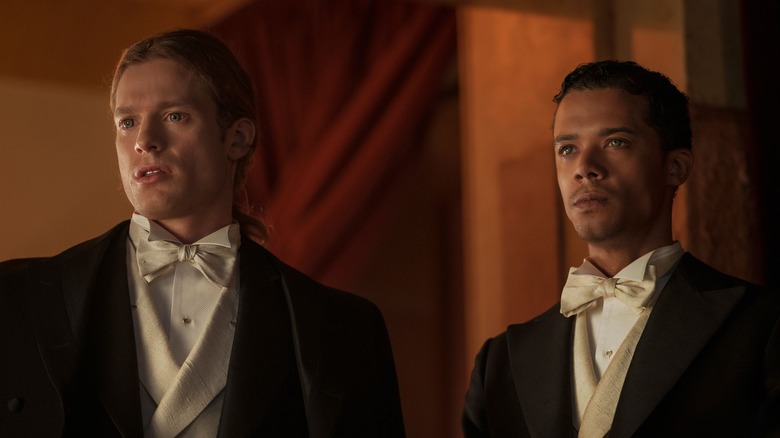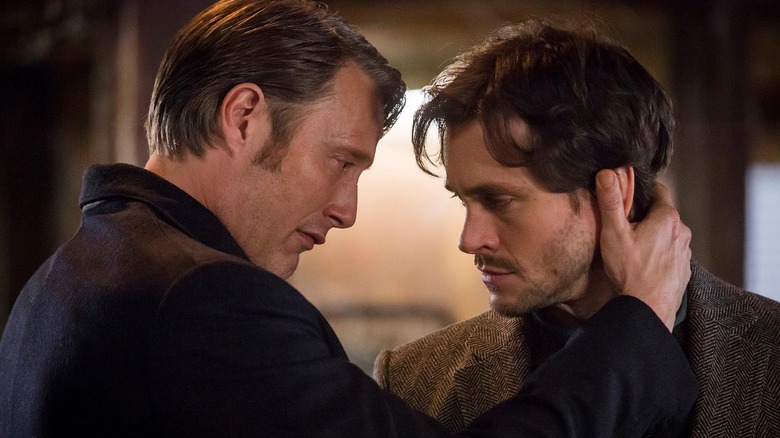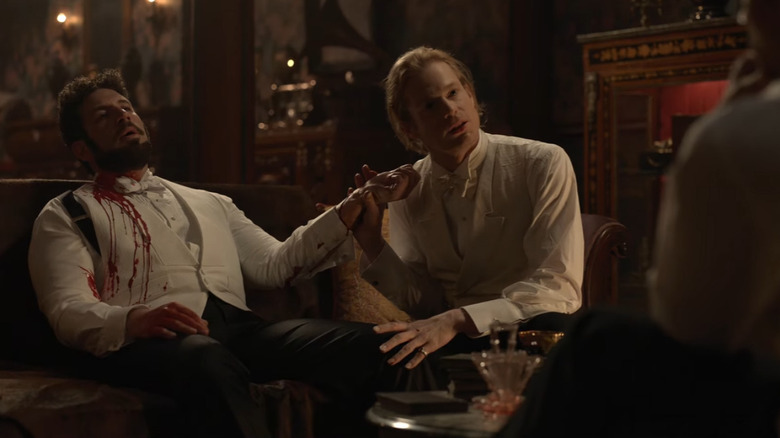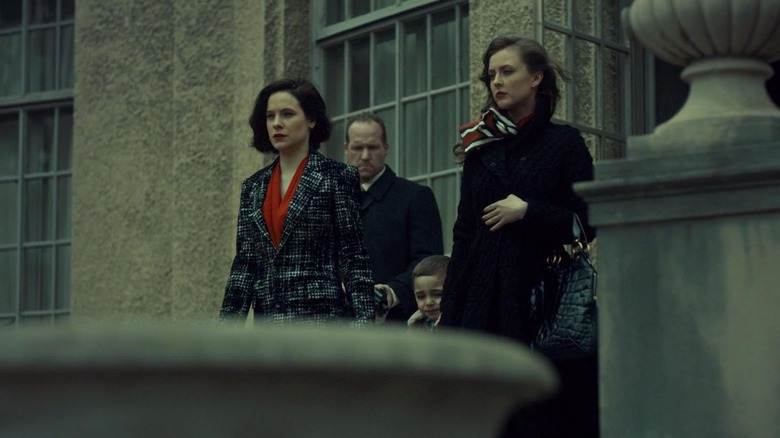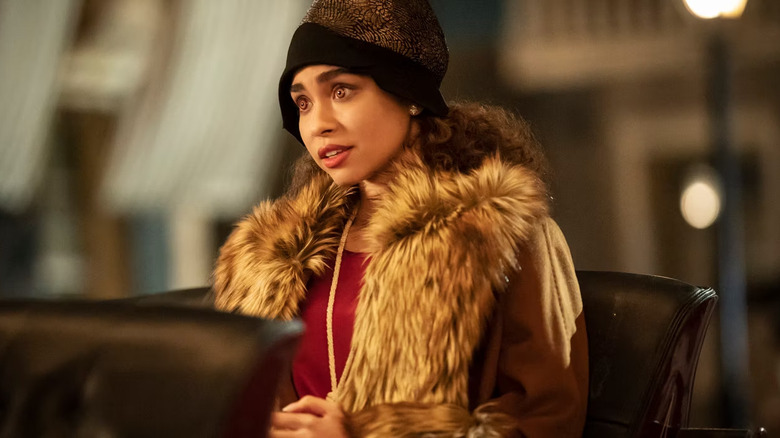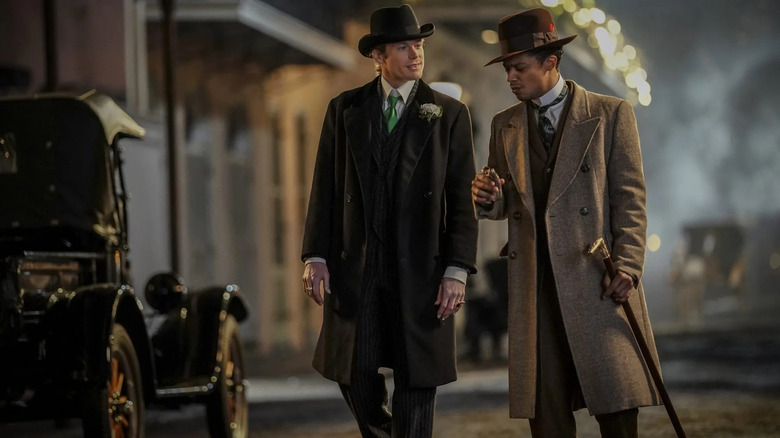Hannibal And Interview With The Vampire Make The Same Brilliant Adaptation Choice
Adapting a beloved work of fiction into a television series is no easy feat, but somehow both AMC's "Anne Rice's Interview with the Vampire" and NBC's "Hannibal" managed to make the leap with finesse. The secret to their success wasn't treating the text as sacred and recreating it beat for beat, but instead taking the soul of the story and creating something compelling and contemporary. Both shows are based on a series of novels, and both made big changes to make the casts more diverse and the stories more unambiguously queer. "Hannibal" was never able to get explicit about its romance between Hannibal the cannibal (Mads Mikkelsen) and FBI analyst Will Graham (Hugh Dancy) because of network standards and practices, but "Interview with the Vampire" has the freedom of cable to get really, really gay.
By taking chances and making some big changes that could potentially alienate fans who wanted a direct adaptation, both shows are able to create something new that works in conversation with the original work. Both are stories about a toxic romance between two deadly men, and the adopted daughter that ends up stuck between them.
Big bad murder daddies
"Hannibal," created by Bryan Fuller, follows troubled empath Will Graham, who works with the FBI as a criminal profiling instructor. Graham is based loosely on FBI profiler John E. Douglas, the same guy Holden Ford on "Mindhunter" is based on, and he's brilliant at understanding the criminal mind, but isn't all that great at being a person. His overabundance of empathy allows him to feel what murderers feel in order to determine their next move and catch them, but it also makes him extra susceptible to the manipulations of his therapist, Dr. Hannibal Lecter. The two become hopelessly entangled with one another in a game of cat and mouse that occasionally switches positions, and both end up responsible for some bloody deaths.
In the novels "Red Dragon," "The Silence of the Lambs," and "Hannibal," upon which the series is based, Will and Hannibal's relationship is much less romantic and intense, but Fuller's series turns their bizarre prey and predator dance into the stuff of fanfiction writers' greatest dreams. Fuller was originally attached to work on the "Interview with the Vampire" series but left during pre-production in 2018, and it's hard not to wonder how much he influenced the adaptation.
The vampire Lestat (Sam Reid) has a bit in common with Hannibal — they're both fans of the finer things, enjoy the color of blood in the moonlight, and aren't afraid to get their hands dirty. They're also both deeply manipulative, charming men who become enraptured with a man who cares too much. In Hannibal's case, that's Will Graham, but Lestat falls for a kind-hearted businessman named Louis (Jacob Anderson).
Beautiful but toxic queer love
Lestat and Louis do not have the kind of romance anyone should idolize, but it makes for intoxicating fiction. Lestat turns Louis into a vampire, robbing him of his life and his future as a human, but giving him something more in return. Hannibal similarly manipulates Will, using his position as Will's therapist to control him. He even discovers that Will has encephalitis and uses the brain infection to gaslight Will into believing he's secretly a serial killer. That's, uh, pretty messed up, but not much more messed up than turning someone into a vampire without giving them the full context of the decision. Lestat and Hannibal both need to learn a few things about boundaries, but the gentle souls they've taken as their partners in blood-spilling aren't exactly the types to teach them.
While the relationship between Will and Hannibal was never explicitly romantic or sexual in the TV series or the novel, Lestat and Louis' relationship in the novel "Interview with the Vampire" is pretty queer. Rice's vampires don't enjoy the act of sex, something that was changed for the TV series (because why would you make sexless vampires?!), but Louis and Lestat are a toxic romantic pair. The 1994 "Interview with the Vampire" movie didn't quite lean into their romance, because it was 1994 and Tom Cruise and Brad Pitt weren't going to make out, but the AMC series is finally giving fans of Rice's series the complicated queer romance they've been fascinated by since the novel was first released in 1976.
Representation doesn't have to be sunshine and roses
Representation in art matters for a number of reasons, but sometimes people are too keen on making sure that representation is positive. One thing that both "Hannibal" and "Interview With the Vampire" understand well is that love is messy. Love can cause people to do terrible and magnificent things, regardless of the genders of the people involved in that love. The queer romances at the heart of these shows are fantastical in many ways but are still deeply human. They are stories of control and desire between complicated people, which is what makes them so compelling. Tragic romances are some of the most famous in history for a reason, and it's about time television caught up and gave LGBTQ couples their own chance to be miserable.
"Hannibal" also made sure to show that queer couples can be happy and healthy, too, and Alana Bloom (Caroline Dhavernas) and Margot Verger (Katharine Isabelle) are the only people in the series to get something resembling a happy ending. The two even raise a child together, and seem to do it well, which is something that both sets of murder daddies were incapable of doing.
Daughters in death
Both couples have impressive body counts, but their greatest crimes are against their surrogate daughters. Will and Hannibal take fledgling killer Abigail Hobbs (Kacey Rohl) under their wings after Will kills her serial killer father, though neither man proves to be a very good parental figure. Abigail is empathetic, like Will, but learns to be manipulative like Hannibal, though her humanity eventually dooms her.
The vampires have their own surrogate daughter in the form of Claudia (Bailey Bass), a young girl who Lestat transforms into a vampire after Louis saves her from a fire. They treat her as their child, their eternal doll, though she eventually grows old enough and smart enough to demand her own agency. Claudia eventually ends up trying to kill Lestat, turning on one eternal father to try and save the other from his manipulation. Both Abigail and Claudia are able to see the toxicity between their two father figures, but neither is ultimately able to do anything about it. In the end, Abigail and Claudia are both only pawns for their disturbed dads, and they both pay dearly for that toxic love.
Accuracy isn't everything
I love Anne Rice's "Vampire Chronicles." They were the books that I buried myself in during my adolescence, the world that I escaped to when being a teenager was just too much to bear. I felt protective and worried about all of the changes I saw coming in the new AMC series. Louis as a Black man, when he had formerly been a plantation owner? Claudia a teen instead of a young girl? I'm glad that I wasn't too precious with my memories of the novels to try the series, however, because it's great. The changes serve the story, which has been updated for the 50ish years that have passed since the novel was first published, and it honestly breathes new life into the old tale. This Louis and the Louis from the book can both exist in my mind, just as the comic book John Constantine can live alongside the Keanu Reeves version just fine. The more, the merrier!
When it comes to adaptation, sometimes the most important thing to keep accurate is something intangible, the "soul" of the thing. In the case of both "Hannibal" and "Interview with the Vampire," the twisted souls of the original texts have clearly been preserved.
